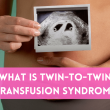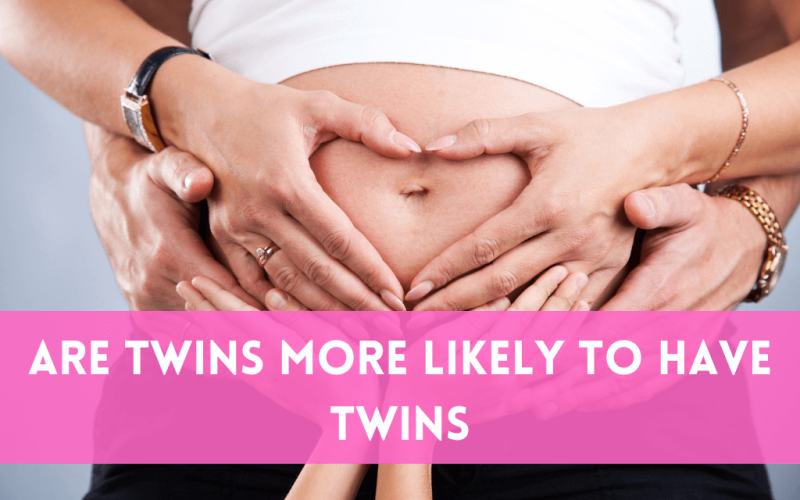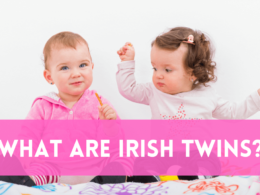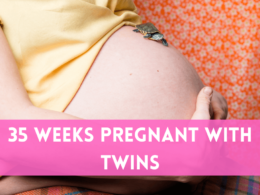Have you ever seen a twin with their own twins? Surprising and interesting, right? Well, the phenomenon is very rare but not impossible. But with that phenomenon, we face the question of whether twins are more likely to have twins or not.
There are also many types of twins. Which twins are more likely to conceive twins deserves an answer too. To address all of that, we have stated scientific explanations with facts and data. Let’s have a look!
Are Twins More Likely to Have Twins?

The easier answer is yes. Twins are more likely to have twins. It is also influenced by several factors. In normal cases, as in for people who are not twins, factors can range from artificial ways to natural phenomena. But for twins, the chances are a bit higher since they already have the twinning factor in their genes.
But here’s a catch- if you know how different types of twinning occur you will see that fraternal twins are influenced by genes but identical twins aren’t. Identical twinning happens solely by chance and the rate is about 0.03% as in 3 in every 1000 birth.
It happens when an egg is fertilized by sperm and gets divided. It is also the reason why the siblings are identical. But because it doesn’t have anything to do with the DNA, the twins don’t have it in their genes. They aren’t any more likely to produce twins than another person.
The probability in both cases remains at 0.03%. It doesn’t show in their DNA that they are twins. But in the case of nonidentical twins which we call fraternal twins, the case is the opposite. Since it happens because of hyperovulation we can say that it stays in their DNA.
What happens, in this case, is that both eggs are fertilized at the same time. It happens when ovaries are overstimulated. Usually, mothers with a single child have one of their eggs fertilized. But when multiple eggs are fertilized we see multiple births that aren’t identical. Therefore, the trait of having overstimulated ovaries can be a part of their family and stay in the DNA. When the next generation tries for a baby multiple eggs can be fertilized. Hence we get nonidentical births. Other than that, some factors like mothers who are over the age of 35, with artificial fertilization treatment have more chances of having twins.
As a result, people who are nonidentical twins have the hyperovulation system ingrained in their genes. When they try for babies, they are more likely to have twins due to hyperovulation than others.
But the chances are still very low. It is slightly higher than the general population for fraternal twins but not more than that. Although the answer is yes twins are more likely to have twins, the truth is the likelihood is still very low and never guaranteed.
It can also happen that when the nonidentical twins are boys they pass on the genes to the next generation because they can’t ovulate. So if they ever have a daughter she is more likely to have hyperovulation. But it never shows in men because they don’t have the ovulation system and twinning can’t be influenced by sperm.
What Does Science Say About Twins Being More Likely to Have Twins
Although the twinning sector is much less researched about others, there are still some explanations. The fact that twins are more likely to have twins have a multidimensional explanation in medical science. The factors are stated below
Genes
The first one is definitely genetics. Disregarding the classification of twins, we can say that twins either inherit it from their parents or it can happen spontaneously because of genetic mutation.
Environment
The second one is the environmental factors such as diet and history of having twins. In some cases, locations are also responsible for twin pregnancy.
In some countries, like Nigeria, the rate of twins is higher. Experts say that the reason can be diet. Having specific food slightly increases the chance of twins.
Age
The mother’s age also affects the twin pregnancy. The reason is that older women are more likely to release multiple eggs. What we previously mentioned is superovulation. The reason is purely hormonal. As women get older the hormone is more responsible for causing multiple eggs to be released. It mostly happens to women in their late 30s or 40s. But the chances are still pretty low.
According to a new international collaboration involving researchers at The University of Western Australia, “women are more likely to conceive fraternal twins once they reach their 30s as a result of an evolutionary response to combat declining embryo viability”. You can watch the researcher talk about it more here-
If twins are in their 30s or 40s that increases the chance of having twins even more.
IVF
With IVF it is already more likely to have multiple babies. For twins who have hyperovulation in their DNA, the chances go slightly higher. The process is artificially creating fertility.
While it helps couples who are struggling to conceive have babies, it might also create a chance of multiple ones at once.
Race
The race of twins can also be an important factor. Having twins is much less likely for Asian descendants. But it is higher in Caucasian women. The reason might be having a history of twin pregnancy in their DNA.
Therefore we can say that a twin of Caucasian descent might be more likely to have twins that an Asian twin.
Conclusion
Whether twins will have twins or not can never be answered for certain. We can only explain the data and count the probability of how likely it is. Even then the probability is very low. It also takes into account other factors that have nothing to do with being twins.
With the progress of medical science and more research, we can find even more precise data that might open the door to new information.








